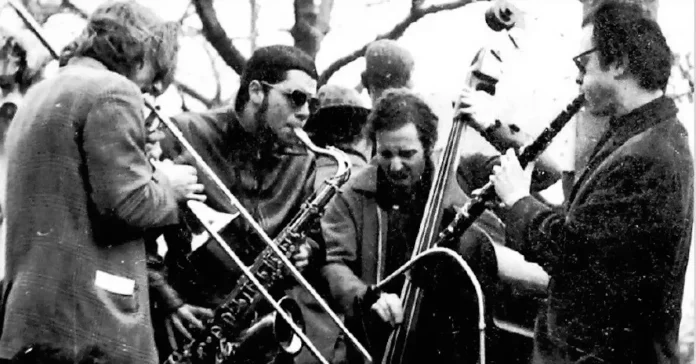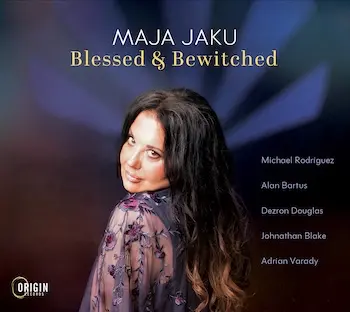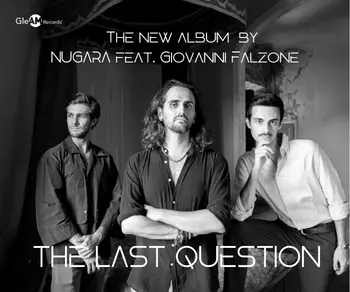David Bailis: Running Through My Mind (Triple 1 Music)
Bailis is one of those guitarists who at one and the same time display a relatively personal approach to their instrument yet ensure that their music falls well within the polite, machine-tooled, largely undemanding realm of contemporary jazz. While there’s nothing essentially wrong with that, the places in this album where he makes his guitar sound more like a keyboard instrument than a stringed one are for me the only moments provoking a raised eyebrow.
Stevie Wonder’s Joy Inside My Tears is one of the two non-originals here, the other being Donny Hathaway’s Jealous Guy, both of which are played on solo guitar and thus afford the listener the best insight into Bailis’s undoubted dexterity, which on these occasions comes with a measure of what might be called emotional commitment the like of which adds depth which seems lacking elsewhere.
The full band that’s made up of the leader, Caroline Davis on alto sax, Andrew Links on keyboards, bassist Jordan Scanella and drummer Kenneth Salters is featured on Zenith where Scanella evokes the spirit of Hugh Hopper and thus alludes to music falling outside of the slick territory this album embodies, and Bailis gets those (electric) keyboard-like sounds from his guitar. The polished production has the effect of keeping everything in order, and to the extent that the thought that this is music made for digital production is hard to escape.
Rhythmic activity juxtaposed with blandness of line serve to keep the notably untrashy Ordinary Trash from the ideal of some of John Abercrombie’s quartets, and while the outcome is of a piece with the rest of the album, Bailis’s work in an area which might be considered to be at the edge of his instrument’s widely recognised range seems overly polite, as if the taking of risks would only serve to alienate the conservative audience the album’s intended for.
Patricia Brennan: Of The Near And Far (Pyroclastic Records PR43)
Vibraphone and marimba player Brennan has with this set encapsulated a strain of what might be called 21st century chamber music in the sense that the presence of a string quartet and a considered approach to composition combine, resulting in music that nods to little in the way of the jazz tradition. This is refreshing, as is the inspiration she’s drawn from the sky, the stars and the richness of the night-time firmament, which in less capable hands might have resulted in something more soporific than demanding. As it is, the latter applies deeply here, and the former doesn’t get a look in.
Brennan’s status as a member of guitarist Mary Halvorson’s Amaryllis Sextet, whose current album is as yet unheard by me, is an indication of the place she occupies in one of the less densely populated realms of the 21st century jazz world. An area in which the music of the two women might be considered to overlap is that of indeterminacy. In this album’s case that’s highlighted on the opening Antlia, where a firm impression of composition and improvisation coalescing – between the work of the strings and that of guitarist Miles Okazaki, for example – results in an impact both refined and grounded. This is particularly notable given that Brennan is a musician who shows no overt jazz lineage, unless we take the more rarefied aspects of Bobby Hutcherson’s playing and the music of Walt Dickerson into account.
That chamber music reference is specially pertinent when it comes to Lyra, where a measured approach is the order of the day, though not to the point where the music is stilted or contrived. Pianist Sylvie Courvoisier is alert to every nuance and the empathetic, understated contribution of drummer John Hollenbeck imparts just enough impetus to maintain the presence of jazz in some relatively conventional sense.
Steve Tintweiss & The Purple Why: Live In Tompkins Square Park 1967 (Inky Dot Media IDM CD004)
In this case the date and indeed the location of recording are unusually relevant: the date’s indicative of a world now lost, as opposed to, say, the worlds of hard- and post-bop – which could be said to take in any year between around 1953 and the present day, while the place highlights how neo-free “edgy” jazz was still put before audiences in public spaces over half a century ago – in contrast to the covers bands and ABBA tribute acts which are staples today.
Bass player Tintweiss, in as much as he has any profile at all on this side of the Atlantic is arguably best known for the time he spent working with Albert Ayler in what turned out to be the twilight of the latter’s brief life, in particular a series of gigs played at the Fondation Maeght in France in July 1970. Those gigs are a clue to the music on offer here, which is of the “in the moment” persuasion and hangs on sketchy, minimal themes and thus leaves wide open spaces for the improvisers to flourish in. Trumpeter Jacques Coursil is one of them and he too has a low transatlantic profile. His work, as much as that of clarinet player Perry Robinson, passingly emphasises a connection between the most venerable form of jazz that emerged from New Orleans and this music, which was/is simultaneously very much of its time.
With all of this in mind, a title like Are You Lonely resonates deeply, made up as it is of low-key music which acts as a preliminary for the collective blast of Waltz Of Eternity, where the notionally New Orleans weave of Robinson and tenor sax player Joel Peskin is subjected to the double-drum barrage of Jemeel Moondoc associate Laurence Cook and Randy Kaye.




